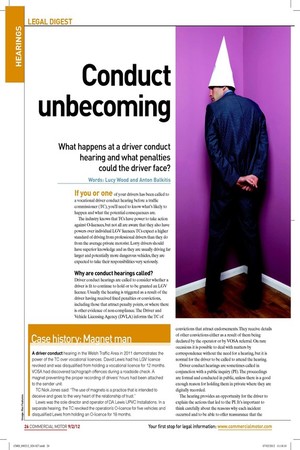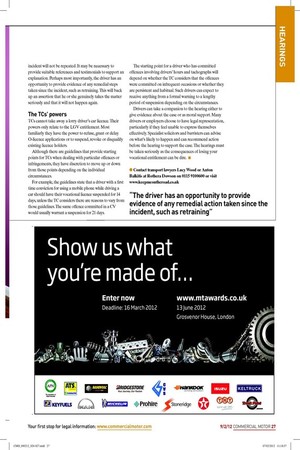Conduct unbecoming
Page 19

Page 20

If you've noticed an error in this article please click here to report it so we can fix it.
What happens at a driver conduct hearing and what penalties could the driver face?
Words: Lucy Wood and Anton Balkitis Ifyou or one of your drivers has been called to a vocational driver conduct hearing before a trafic commissioner (TC), you’ll need to know what’s likely to happen and what the potential consequences are.
The industry knows that TCs have power to take action against O-licences, but not all are aware that they also have powers over individual LGV licences. TCs expect a higher standard of driving from professional drivers than they do from the average private motorist. Lorry drivers should have superior knowledge and as they are usually driving far larger and potentially more dangerous vehicles, they are expected to take their responsibilities very seriously.
Why are conduct hearings called?
Driver conduct hearings are called to consider whether a driver is it to continue to hold or to be granted an LGV licence. Usually the hearing is triggered as a result of the driver having received ixed penalties or convictions, including those that attract penalty points, or where there is other evidence of non-compliance. The Driver and Vehicle Licensing Agency (DVLA) informs the TC of incident will not be repeated. It may be necessary to provide suitable references and testimonials to support an explanation. Perhaps most importantly, the driver has an opportunity to provide evidence of any remedial steps taken since the incident, such as retraining. This will back up an assertion that he or she genuinely takes the matter seriously and that it will not happen again.
The TCs’ powers
TCs cannot take away a lorry driver’s car licence. Their powers only relate to the LGV entitlement. Most familiarly they have the power to refuse, grant or delay O-licence applications or to suspend, revoke or disqualify existing licence holders.
Although there are guidelines that provide starting points for TCs when dealing with particular offences or infringements, they have discretion to move up or down from those points depending on the individual circumstances.
For example, the guidelines state that a driver with a irst time conviction for using a mobile phone while driving a car should have their vocational licence suspended for 14 days, unless the TC considers there are reasons to vary from those guidelines. The same offence committed in a CV would usually warrant a suspension for 21 days. The starting point for a driver who has committed offences involving drivers’ hours and tachographs will depend on whether the TC considers that the offences were committed on infrequent occasions or whether they are persistent and habitual. Such drivers can expect to receive anything from a formal warning to a lengthy period of suspension depending on the circumstances.
Drivers can take a companion to the hearing either to give evidence about the case or as moral support. Many drivers or employers choose to have legal representation, particularly if they feel unable to express themselves effectively. Specialist solicitors and barristers can advise on what’s likely to happen and can recommend action before the hearing to support the case. The hearings must be taken seriously as the consequences of losing your vocational entitlement can be dire. ■ • Contact transport lawyers Lucy Wood or Anton Balkitis at Rothera Dowson on 0115 9100600 or visit www.keepmeontheroad.co.uk
Case history: Magnet man
A driver conduct hearing in the Welsh Traffic Area in 2011 demonstrates the power of the TC over vocational licences. David Lewis had his LGV licence revoked and was disqualified from holding a vocational licence for 12 months. VOSA had discovered tachograph offences during a roadside check. A magnet preventing the proper recording of drivers’ hours had been attached to the sender unit.
TC Nick Jones said: “The use of magnets is a practice that is intended to deceive and goes to the very heart of the relationship of trust.” Lewis was the sole director and operator of DA Lewis UPVC Installations. In a separate hearing, the TC revoked the operation’s O-licence for five vehicles and disqualified Lewis from holding an O-licence for 18 months. convictions that attract endorsements. They receive details of other convictions either as a result of them being declared by the operator or by VOSA referral. On rare occasions it is possible to deal with matters by correspondence without the need for a hearing, but it is normal for the driver to be called to attend the hearing.
Driver conduct hearings are sometimes called in conjunction with a public inquiry (PI). The proceedings are formal and conducted in public, unless there is a good enough reason for holding them in private where they are digitally recorded.
The hearing provides an opportunity for the driver to explain the actions that led to the PI. It’s important to think carefully about the reasons why each incident occurred and to be able to offer reassurance that the











































